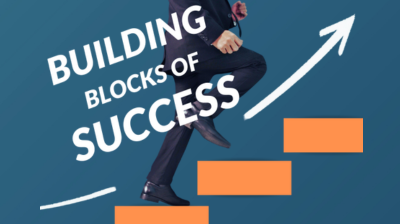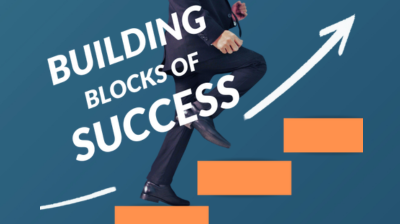The content of this recording is copyrighted by Sandler Systems, LLC. All rights reserved.
Transcript
Glenn Mattson
Well, welcome to the Building Blocks of Success, we're in season three, episode four. Now we're dealing with vision. So when we look at vision, vision is a really important thing and it's very different than goal settings, let's take a look at what really vision is, how does it work? What are some of the benefits from it? And then from that, we can take a look at some pieces and how to ensure that the vision is getting us where we want to go.
Glenn Mattson
So vision, and again, this is many times when I'm having coaching sessions, I'm having training sessions. And we're talking about goals. And I find many people when they start to accomplish their goals, they start to lose motivation because every year they have to reevaluate the why, like, what am I doing this for? What am I ultimately going towards? So I wanted to spend a couple minutes and talk to you about vision, and what vision looks like. And what's the differences of that and goal setting, and how we can make sure that we have a good vision. So how to create one.
Glenn Mattson
So when we look at this, I want to spend a couple seconds and really helping you understand that vision is really a crucial element, I think of personal and professional growth, that helps us as individuals create a kind of a clear and inspiring picture of what we want. Right, it involves visualization, because you got to understand your brain does not know the difference between real and not real. Right. So visualization, if you've never done it before, is a really powerful, powerful technique, where you sit back and you envision what you want to achieve in different areas of your life, career, relationships, health, financial, right, so but these are not things of where you want to be in a year from now.
Glenn Mattson
Vision setting is really important because it gives you where you want to be in 40 years down the road. And it's important because it gives you a really clear direction, motivation and sometimes focus towards what you're trying to do, and more importantly, why you're trying to do that. So vision really helps you and if you have a compelling vision, it really helps you overcome obstacles, it makes you make much better decisions and your experience of a sense of fulfillment and satisfaction goes right to the roof. It's really a very powerful tool for creating the life that you've always wanted and unlimited potential, right? So it's unlocking that, that full potential that what you have.
Glenn Mattson
Now, let's be clear about a couple things, vision and goals are very different. Vision is what you ultimately are trying to fight for; vision is what you're ultimately trying to accomplish. And I'll share mine with you in a couple seconds, but vision has to be something that's specific to you. My vision of my future was very different than my parent’s vision of my future; different than my brother's vision, right. So I have to make sure that my vision of my future was the same as Heather, which is my wife, right? So we have very similar vision of the future so that we're cohesive. So, you know, vision is really about setting long term inspiring and really meaningful direction on what you want to achieve.
Glenn Mattson
Now goals is all about setting specific, measurable and achievable targets to get to that vision. So if you think about vision for a moment, vision is going to reflect your values, your passions, for sure, your purpose, it's going to be things that you want to do over your lifetime. It's about creating a compelling and meaningful. I hate to use the word vision again, vision of what inspires you and motivates you to take action, right. Now we're gonna get to that in a second. So what's your vision? What's your long term goal? I personally grew up in a household that had a ton of love and a ton of affection and everything that we kind of needed, but nothing of above and beyond. So, you know, part of my vision when I was young is I wanted stuff. I wanted things that I couldn't have when I was younger, I wanted things that I couldn't afford. I also didn't want to have the feelings that I had at certain times when I knew I couldn't get stuff done. And I didn't want to feel bad about it, because my parents couldn't afford it. So these feelings that I had are motivation, their motivation of what I didn't want, or what I did want moving forward. So some of you may look at this and say, wow, he's a kind of a simple guy, and I am right, my vision is I wanted to be rich. I wanted to be not rich, wealthy, I wanted to have the capacity to provide for my wife, provide for the kids, have my children not worry about funding college or other things. I wanted that responsibility on me. So I had a vision of things of what I wanted the car, I wanted to drive the house, I wanted to live in, the lifestyle they were going to have, what retirement look like. It's very clear vision.
Glenn Mattson
Now, on the other hand, I really had no idea how I was going to get there. If you asked me every year for 20 some odd years, Glenn, what's your vision? Where do you want to be? Never changed. Now, goal setting is the process of breaking down my vision to very specific, measurable, and attainable targets. So goals are tangible. They have action items that can help me track and stay focused, right. So unlike a vision goals have short term timeframes and it's usually a month or a year, right. So you can have an annual goal, broken down a quarterly goals, broken down to monthly goals, broken down to weekly goals, broken down to your daily goals. If I do my daily activities, I hit my numbers for the week, I hit my numbers for the week, I'll do it for the month, month, this quarter, quarters a year, years, so on. But my vision is when I get knocked down. Now I understand why I'm doing all this crazy stuff. Now I understand that I'm prospecting or I'm doing all these other things. It's just a means to an end on the way to my vision.
Glenn Mattson
So what's your vision? What do you see long term again, I was pretty simple. I wanted stuff I couldn't have. I want it to feel not the way I did when I was younger when I didn't have things. So my vision was about wealth, money and attaining. Good, bad or indifferent. It is what it is. So I was not being unethical, was never going to be immoral, who was always going to be on the right path. So I'd always ask myself, what I'm about to do is going to help me get to that point or is it going to get me farther away? Listen, when I was in Connecticut, with all my friends, I had a great, great life. When I graduated college. I was playing sports during the week; I had teams I was on and my career is doing great. I had two different jobs, and my business was taking off, but for me to do the business that I was in, which is consulting where I am right now. Not the business I was doing. But for me to be successful. Honestly, I had to look at myself and say I had too many distractions. My friends, playing flag football on Sundays, the team I was with is a pub. You can only imagine what happened after we played football, we go to the pub, right? All things that were not going to help me get to where I wanted to be, those distractions. I wasn't strong enough to make the right decisions to stay away from the distractions. So the best thing for me was move away from the distractions. And that's the only way I stayed true to my vision. Because if I didn't, my vision would have been one of those things of oh yeah, remember, that would have been nice. And that's not what a vision is. So vision is was to help you create long term, inspiring and meaningful of what you're trying to get after. So when you have your goals and I understand I have to go do 35 dials a day or 100 dials a day to go see two new people a day to close X amount of business per day or per week. That was the subset for me to have that house on the hill, for me to have those things I always wanted. So it was always am I willing to pay the ferryman? Am I willing to do that work to get to that vision? So it gives you the ability to make sure that you're on track and you're doing the right stuff.
Glenn Mattson
When you have a good vision, here's a couple of things that happen. One, it increases your motivation. Having a clear vision of your desired future can motivate you to take actions. It will motivate you to fulfill your goals. It’ll motivate you to stop making excuses when you don't. The other thing that a vision will give you is focus and direction. It helps you prioritize your goals and focus on what's the most important to you. So you don't have distraction and noise. The third thing that having a good vision does is it really aligns with your values and your purpose. That helps you connect with the really core of who you are. That's the reason that you have such drive towards it.
Glenn Mattson
The next thing a vision does is it really helps you overcome your obstacles. Having a clear vision really makes decision making quite easy. So overcoming your obstacles in decision making, I'm going to put together where that helps you make better, stronger decisions in the avoidance of what you're trying to accomplish how do you know if where you are right now is going to help you get there or not? You can't. You making this decision on where you are right now versus where I am right now is it going to get me where I want to go? So vision really helps you with your decisions. It really helps you overcome obstacles and roadblocks.
Glenn Mattson
The last thing is it helps you create a sense of purpose and fulfillment. Really, honestly makes you happier in what you're doing. It makes you happier, even in the most trying times of your life because you understand the why behind the what. So it increases your motivation, gives you direction, it makes sure your purpose and your values are connected so you have more fulfillment, and it makes you make better decisions along the way.
Glenn Mattson
So how do we create a vision? Because I'll tell you Harvard Business Review will tell you over and over again individuals and organizations have a clear and compelling vision outperform those that don't, plain and simple. So how do we do this? Vision is really about two parts of your brain working at the same time. The creativity side and the discipline side. What I mean by that is you have to be bold in what you want, be imaginative in your vision. But equally important, you have to break it down to reality, and with actionable bite sized pieces. So making sure that it's, I hate to use the word realistic because realistic, I think is what we make it, but having a vision that balances your imagination of where you want to be. And the reality of can you get there?
Glenn Mattson
Now, if you asked me when I was 18 years old, at 55, I'd be running a business this size, helping over 15,000 entrepreneurs, trained well over 200,000 salespeople blow through their numbers, speak in front of 20 people all the way up to seven or 8,000 people, I would have told you you're crazy. But if you told me that my 20s I would just turn around and say, well, if that's the path that's going to get me to my vision, then so be it. I didn't have clarity on who I'd be talking to or the volume of people that I would have helped. That wasn't part of the vision. That was part of my goals. That's what got me to my vision. So as you're sitting here, taking a look at maybe you just graduated, maybe you're a career changer, maybe you're at work and you're trying to figure out am I actually doing what I love? You got to take a look at your core values, your passions, your strengths, your past experiences, you got to be honest with yourself, authentic with yourself, understanding the difference between what you want, what you can get, you should and you have. But sit down and actually start painting some pictures of where you really want your life in the future. Again, I'm not talking 10, 15 years I'm talking 20 or 30 years down the road. What do you want it to look like? What are you willing to fight for? What are you willing to let go of certain things so you can go after things that are better? If you don't have a vision team, and I've said this over and over again. Life is really about a series of individuals, and you look at it individuals. Some people have a plan, some people don't. Let me describe to you a little rule that you may want to think about. There's always a plan in play, there is always a plan in play. If you don't have a plan, by default, you will become part of someone else's. Whoever has the stronger of the two plans will always win. There's always a plan in play, whoever is stronger, whoever has a stronger plan, whoever has the stronger conviction in their plan will always win over those that don't. And you gotta realize, if you do not have a plan, you will become part of someone else's. That can be at work. It can be social, a lot of different places.
Glenn Mattson
So moving forward, take a look at how do you create a vision of where you want to be 10, 15, 20, 30 years so you can constantly ask yourself, am I enroute for that? Am I in target for that? And to get there is your goals. Always remember, your visions will pull you to where you have to go, and they will help you make the right decisions in the darkest times. Make sure you have a strong vision to help you get clarity for your future and to help you with your building blocks of success.
Glenn Mattson
This is the Building Blocks of Success with Glenn Mattson.






